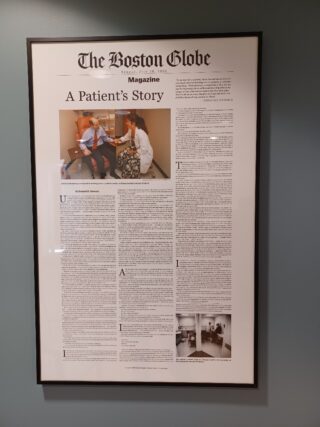Finding commonality, community and connection: Our Schwartz trip across the pond
26 April 2023
Aggie Rice and Laura Golding recall a visit to Schwartz community colleagues in the USA
Topics
The origin story behind Schwartz Rounds has always felt powerful and special and underpins every Round. Together with David Jones, we travelled to an unseasonably sunny and warm New York and Boston in November 2022 on a Schwartz Rounds voyage of discovery. The warmth and generosity that felt so present during our time in the States added a whole new layer of meaning to the story of Ken Schwartz and the legacy that has followed.

The trip was a joy from beginning to end. Squeezed into several busy working days, we had the opportunity to connect with members of the Schwartz Community in New York leading and facilitating Rounds, and met with counterpart colleagues at The Schwartz Center for Compassionate Healthcare (SCCH) in Boston. Also, we were kindly invited to two evening events organised to celebrate compassionate caregivers from across the States.
Much in common
What felt so immediately striking about the trip was how much we shared. We had anticipated coming across difference, and yet with every connection we discovered much in common. Discussions centred around sharing the benefits and challenges of running and sustaining Rounds, and the inherent tension for facilitators and leads within this. Not least, the weight of responsibility that facilitators and leads often hold on top of an already over-stretched day job. We connected over the challenges of running Rounds during the pandemic, the lasting impact of the pandemic on healthcare staff, the pros and cons to running Rounds online, the role of Rounds in challenging systemic prejudice and inequality, the counter-cultural nature of Rounds, the evolution of Rounds and much more.
In the three hospital visits we made in New York, where Rounds have been running for 10-15 years in each, we discovered that the experience was much the same on both sides of the Atlantic. Rounds were being run and facilitated by staff who are passionate about sustaining capacity for compassionate care, with great values and a shared language for the importance of human connection. Added to that, the texture of New York City, with all its sounds and smells and tastes, made for a remarkably energising and nourishing experience.
A warm welcome
We were met everywhere and by everyone with a much-appreciated warmth. Kindness and thoughtfulness underpinned every interaction – contributing to the sense of being part of an international movement. This feeling of kindness and care felt particularly vivid during the dinner to celebrate the winners of the Schwartz Center’s compassionate caregiver awards. We heard stories of, and had the privilege to personally celebrate, the individuals and teams across the States for the exquisite acts of kindness that they had engendered and spread in their organisations. Hearing the difference they had made for the better in the lives of their patients and staff across a strained healthcare system was deeply moving and inspiring and led to a strong sense of hopefulness in humanity and love.
A community of compassion
Coming together with colleagues at the SCCH in Boston felt like a soulful meeting of minds. Over several hours we shared our mutual experience of working with organisations in supporting them to meaningfully embed and sustain Rounds. Our challenges were similar, as were the joys and the commitment. Our conversations took us further as we connected over the significant challenges in our healthcare systems, the political contexts, the need for systemic change and the small but significant role the Schwartz Rounds can play.
We shared stories of organisational culture and narratives, and the need to get to the root cause of distress rather than interventions that provide temporary and unsustainable support, like sticking plasters. We wondered how and whether Schwartz Rounds principles could be routinely incorporated and role modelled in other meeting spaces in healthcare services, and shared our thoughts about how to enable relationship-centred care in our healthcare systems.
A patient’s story
Hanging on the wall of the Schwartz Center offices is a framed copy of Kenneth Schwartz’s Boston Globe article – ‘A Patient’s Story’. Re-reading his story in the very hospital that he received his care for lung cancer and watching unseen (by us) footage of him deepened our connection with this one story that has made the difference to so many. The first story of hundreds of thousands of stories that have come since and had their own impact on contributing to a more compassionate and caring world. We shared how moved we felt by this and how privileged we felt to have had the experience.
The legacy of the trip
So often we hear from the Schwartz Community in the UK and Ireland a deep curiosity about what the Schwartz Community are up to and experiencing ‘across the pond’. It felt important to develop a deeper and more open connection between the two communities, for what we knew would inevitably lend to an expansive, generative and nourishing space for shared learning and connection. Since the trip, we have begun to connect more regularly, sharing experiences, insights, questions, challenges and time. Extending the branches of the Schwartz Community tree feels like a fertile endeavor, and we are excited to see what comes next.
Find our more about Schwartz Rounds
We are grateful to our American colleagues for their warm welcome and for sharing their time, stories, and much more, so generously.
Thanks to: Angie Heller and Sónia Scott at Columbia University-Irving Medical Center; Richard Hawkins at NYP/Weill-Cornell Medical Center; Steven Field and Catherine Constable at NYU Langone Medical Center; Stephanie Adler, Leah Rybarczyk, Michael Goldberg, Beth Lown at the Schwartz Center for Compassionate Healthcare, Boston.